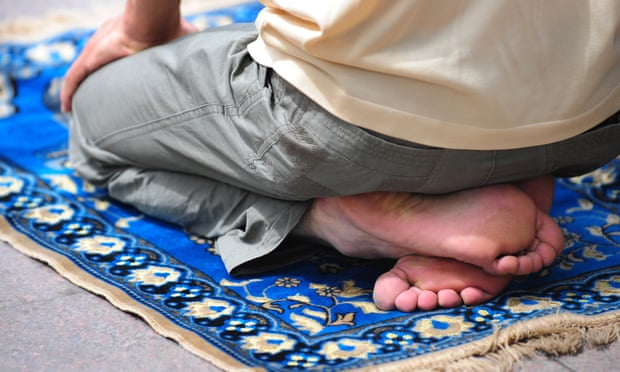Chinese authorities launch ‘anti-halal’ crackdown in Xinjiang

The Guardian,10 October 2018
 By Lily Ku0 – Authorities in Xinjiang have launched a campaign against the “spread of halal,” claiming the growing number of halal products is encouraging religious extremism in the heavily monitored Chinese region.
By Lily Ku0 – Authorities in Xinjiang have launched a campaign against the “spread of halal,” claiming the growing number of halal products is encouraging religious extremism in the heavily monitored Chinese region.
Party officials in Urumqi, the capital of Xinjiang, which is home to about 12 million people from Muslim minorities, on Monday called on government officers to strengthen the “ideological struggle” and fight “halalification” or the “pan halal tendency,” a post on the Urumqi People’s ProcuratorateWechat account said.
The term refers to the extending of halal labelling – food that adheres to Islamic law – to non-food items. Officials and state media say the growing number of products unnecessarily labelled as halal allows Islamic rituals to penetrate secular life in China.
“The pan-halal tendency blurs the boundary between religion and secular life. So it is easy to fall into the mire of religious extremism,” the state-owned Global Times said in an article about the new campaign in Urumqi.
The campaign comes as criticism over China’s counter-terrorism policies in Xinjiang mounts. Rights advocates, researchers and media have documented the use of mass surveillance and internment, as well as the curtailing of religious freedoms of Muslims minorities such as Uighurs, Kazakhs, and Hui in the north-western territory.
Officials in Gansu province, home to a large population of Hui Muslims, shut down more than 700 shops selling “pan-halal products” in March. Services like “halal haircuts” and “halal baths” were also been banned.
Under the hashtag “halalification” or qingzhen fanhua, internet users critical of the trend post photos of items labeled halal, like napkins or milk. One user wrote, “Is there pig blood in ordinary milk? What we should be worried about is national unity, not the unity of religious groups.”
The meeting of party officials on Monday called on all government officers and party members in Urumqi to speak Mandarin Chinese at work and in public, and to reaffirm their commitment to the ideology of the Chinese Communist party.
Liu Ming, secretary of a party member group, led the attendees in an oath, according to the Wechat statement. A photo shows Liu speaking into a microphone, his fist clenched in the air, pledging: “My belief is Marxism-Leninism. I don’t believe in any religious belief. I must decisively fight against halalification to the end”.
The meeting also called on officials to publish their own articles to “express their stand against the pan-halal tendency.” One Uighur official named Ilshati Wusman, wrote an article titled: “Friend, you don’t have to look for halal restaurant for me.” He wrote, “We ethnic minorities have taken it for granted that this is a respect for our eating habits. We have not thought about respecting their eating habits.”
He encouraged his Uighur peers who are also party members to eat with their Han colleagues rather than solely at halal restaurants. He added: “Changing eating habits has a significant and far-reaching impact for countering extremism!”
“The pan-halal tendency blurs the boundary between religion and secular life. So it is easy to fall into the mire of religious extremism,” the state-owned Global Times said in an article about the new campaign in Urumqi.
The campaign comes as criticism over China’s counter-terrorism policies in Xinjiang mounts. Rights advocates, researchers and media have documented the use of mass surveillance and internment, as well as the curtailing of religious freedoms of Muslims minorities such as Uighurs, Kazakhs, and Hui in the north-western territory.
Officials in Gansu province, home to a large population of Hui Muslims, shut down more than 700 shops selling “pan-halal products” in March. Services like “halal haircuts” and “halal baths” were also been banned.
Under the hashtag “halalification” or qingzhen fanhua, internet users critical of the trend post photos of items labeled halal, like napkins or milk. One user wrote, “Is there pig blood in ordinary milk? What we should be worried about is national unity, not the unity of religious groups.”
The meeting of party officials on Monday called on all government officers and party members in Urumqi to speak Mandarin Chinese at work and in public, and to reaffirm their commitment to the ideology of the Chinese Communist party.
Liu Ming, secretary of a party member group, led the attendees in an oath, according to the Wechat statement. A photo shows Liu speaking into a microphone, his fist clenched in the air, pledging: “My belief is Marxism-Leninism. I don’t believe in any religious belief. I must decisively fight against halalification to the end”.
The meeting also called on officials to publish their own articles to “express their stand against the pan-halal tendency.” One Uighur official named Ilshati Wusman, wrote an article titled: “Friend, you don’t have to look for halal restaurant for me.” He wrote, “We ethnic minorities have taken it for granted that this is a respect for our eating habits. We have not thought about respecting their eating habits.”
He encouraged his Uighur peers who are also party members to eat with their Han colleagues rather than solely at halal restaurants. He added: “Changing eating habits has a significant and far-reaching impact for countering extremism!”

